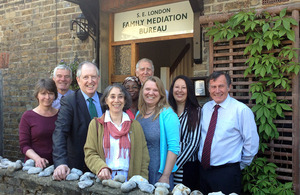New mediation laws to help separating couples
Separating couples will be legally required to find out about ways to settle disputes away from the courtroom, under new laws currently going through Parliament.

Justice Minister Lord McNally with staff from the Family Mediation Bureau in Bromley, South East London.
New figures show that 124,420 couples filed for divorce in 2012 but instead of potentially long and costly court hearings couples opted for mediation – a quicker, cheaper option which provides better outcomes. Last year 67% of all publicly funded couples resolved their concerns out of court with a qualified mediator.
Visiting the Family Mediation Bureau in Bromley, South East London, the Family Justice Minister Lord McNally met with families who have successfully used mediation to reach agreements over children and property and finance matters.
The changes mean that separating couples will have to attend an initial information and assessment session to see whether it would be better for them to use mediation than to get embroiled in a legal battle over dividing property and agreeing child custody arrangements.
Over the next two years the Government is predicting a sharp rise in the use of mediation for separating couples. To support this move the Ministry of Justice has introduced the new laws in the Children and Families Bill which is currently progressing through Parliament.
Family Justice Minister Lord McNally said:
‘The benefits of mediation are clear – it is quicker, cheaper and leads to better outcomes. That is why we are introducing new laws – which will require couples to attend a mediation information assessment meeting first - to find out more and consider whether it is suitable for them.
‘I want to see separating couples, wherever possible, use mediation. The court should be a last resort when couples are working out how to split assets and arrange time with the children.’
In recent years greater numbers of people have been successfully using mediation – where they are helped to agree the issues between themselves rather than argue it out through lawyers with a judge taking the final decisions – and to support this shift the Government has set aside £25million so more couples can do the same.
Helping with all the issues thrown up by a break up is the new government-funded web app Sorting out Separation, which is the first ever online one-stop shop for separated families. Thousands have already visited the site which aims to help separating parents minimise the impact of their break up on their children.
Mediation can be quicker, cheaper and provide better outcomes than going to court. It allows people to explain their concerns and needs in the presence of a qualified mediator, giving them the opportunity to communicate directly with each other, rather than via solicitors or across a courtroom. It is then they, rather than a judge, who decide a mutually acceptable outcome.
Notes to editors:
- For more information please call the Ministry of Justice press office on 020 3334 3536.
- The average cost of resolving property and financial disputes caused by separation is approximately £500 through mediation for a publicly funded client, compared to £4,000 for issues settled through the courts. The average time for a mediated case is 110 days compared to 435 days for non-mediated cases.
- The additional funding is expected to meet increased use of mediation from April 2013 and will provide additional public funding for eligible couples to use mediation. The Government currently spends £15m a year on family mediation.
- Mediation won’t be right for everyone. Some people will be able to sort out their own disputes without using mediation or going to court, and in certain circumstances – such as with domestic violence or child protection - legal action through the courts may be needed.
- Information for anyone considering divorce or separation, advice on some of the support and services available is available at www.gov.uk.
- Searches for ‘divorce’ on www.justice.gov.uk increased from 744 in December 2011 to 1,364 in January 2012. There were 692 searches on DirectGov (now GOV.UK) for ‘divorce process’ in the first week of January 2012, compared to 188 in the first week of December.
Updates to this page
Published 5 June 2013Last updated 5 June 2013 + show all updates
-
Addition of a new image from the visit.
-
First published.